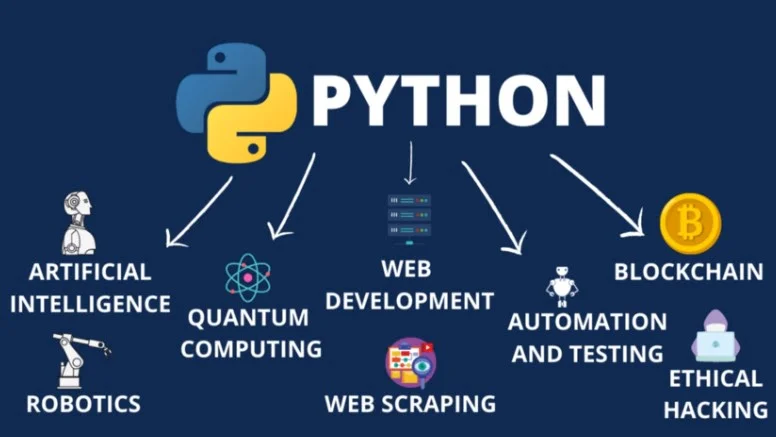In today’s fast-paced digital world, coding has become an essential skill, and among the many programming languages available, Python stands out as one of the best to learn. Whether you are a beginner, an experienced developer, or someone from a non-technical background, learning Python can open up countless opportunities. Its versatility, ease of use, and growing demand make it an invaluable skill in multiple industries. In this article, we will explore the key reasons why everyone should learn Python and how it can benefit individuals across various professions.
1. Python is Beginner-Friendly
One of the biggest reasons Python is so popular is its simplicity. Unlike other programming languages that require complex syntax and extensive knowledge, Python is designed with readability in mind. The language uses plain English-like commands, making it easier for beginners to grasp basic programming concepts without being overwhelmed by syntax rules.
For example, printing “Hello, World!” in Python is as simple as:
print("Hello, World!")This straightforward syntax allows beginners to quickly get started without frustration, making Python an excellent choice for first-time programmers.

2. Versatility and Wide Range of Applications
Python is not just for one specific field; it is used in various domains, including:
- Web Development – Frameworks like Django and Flask make building websites easy and efficient.
- Data Science and Machine Learning – Libraries such as Pandas, NumPy, and Scikit-learn enable data analysis, visualization, and machine learning models.
- Automation and Scripting – Python automates repetitive tasks, saving time and effort.
- Cybersecurity – Many cybersecurity experts use Python for penetration testing and security automation.
- Game Development – Frameworks like Pygame make it possible to develop simple games.
- Finance and Trading – Python is used in algorithmic trading and financial analysis.
This versatility ensures that no matter what industry you are in, Python can be a valuable tool in your skillset.
Buy Norton 360 Premium 2025, Antivirus software for 10 Devices with Auto Renewal – Includes VPN, PC Cloud Backup & Dark Web Monitoring [Key card]
3. High Demand in the Job Market
The demand for Python developers has skyrocketed in recent years. Companies across various industries are looking for professionals skilled in Python, making it one of the most lucrative programming languages to learn. According to job market analysis, Python-related job postings have significantly increased due to its applications in emerging technologies like artificial intelligence, machine learning, and data science.
By learning Python, you increase your employability and open doors to career opportunities in high-paying fields like software development, data analytics, and cybersecurity.
4. Large and Supportive Community
When learning any programming language, having access to a strong community can be incredibly beneficial. Python has one of the largest and most active programming communities in the world. There are numerous online forums, documentation, video tutorials, and open-source projects that provide guidance and support for learners of all levels.
If you ever get stuck while coding, chances are someone else has encountered the same issue and has already provided a solution on platforms like Stack Overflow, GitHub, or Reddit.
5. Extensive Libraries and Frameworks
Python comes with a rich ecosystem of libraries and frameworks that simplify development. Whether you need to analyze data, build web applications, or automate tasks, Python has a library for nearly everything. Some of the most commonly used libraries include:
- NumPy and Pandas – For data manipulation and analysis.
- Matplotlib and Seaborn – For data visualization.
- TensorFlow and PyTorch – For machine learning and deep learning.
- Requests and BeautifulSoup – For web scraping.
- Selenium – For browser automation.
These pre-built libraries save developers time and effort, allowing them to focus on solving real-world problems instead of writing code from scratch.
6. Python is Great for Automation
One of the most practical uses of Python is automation. Whether you are an office worker, IT professional, or digital marketer, you likely have repetitive tasks that take up valuable time. Python allows you to automate these tasks, improving efficiency and productivity.
For example, you can use Python to:
- Automatically generate reports.
- Scrape data from websites.
- Send bulk emails.
- Organize files and folders.
- Schedule tasks and reminders.
By learning Python, you can automate mundane tasks and focus on more important aspects of your work.
7. Python is a Gateway to AI and Machine Learning
Artificial Intelligence (AI) and Machine Learning (ML) are transforming industries, and Python is at the forefront of this revolution. With libraries like TensorFlow, Keras, and Scikit-learn, Python provides powerful tools for building AI and ML models.
If you are interested in working in AI/ML, learning Python is a must. It is widely used in predictive analytics, natural language processing, and neural networks, making it a top choice for researchers and engineers.
8. Python is Cross-Platform and Open-Source
Python is an open-source language, meaning it is free to use and has a massive community contributing to its development. Additionally, Python is cross-platform, meaning it can run on Windows, macOS, and Linux without modification.
This flexibility ensures that Python can be used in various environments, making it an excellent language for both personal projects and enterprise applications.
Breaking News: Great offers on ASUS TUF Gaming 27″ 2K HDR Monitor
9. Enhances Problem-Solving and Logical Thinking
Programming in Python helps develop problem-solving skills and logical thinking. Learning how to write code requires breaking down problems into smaller steps and thinking analytically. These problem-solving skills are not only beneficial for coding but also for various aspects of life and work.
Even if you don’t plan to become a full-time programmer, learning Python will improve your ability to think critically and approach challenges with a structured mindset.
10. Python for Non-Programmers
Python isn’t just for software developers. It is also useful for non-programmers, including:
- Data Analysts – To analyze and visualize data.
- Scientists and Researchers – To process large datasets and conduct experiments.
- Marketers – To automate data collection and campaign tracking.
- Teachers and Educators – To introduce students to coding in an easy and engaging way.
With the growing importance of digital skills, even individuals in non-technical roles can benefit from Python’s capabilities.
Conclusion
Python is an incredibly powerful and versatile language that is easy to learn and highly valuable in today’s job market. Whether you want to build websites, analyze data, automate tasks, or explore artificial intelligence, Python provides the tools to do so efficiently. With its simplicity, vast ecosystem, and high demand, there has never been a better time to learn Python.
So, why wait? Start your Python journey today and unlock a world of possibilities!
